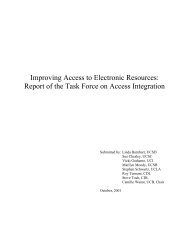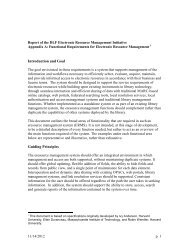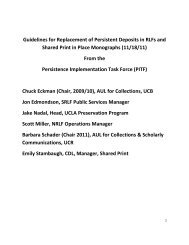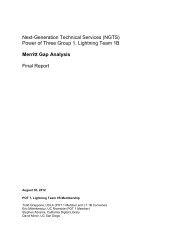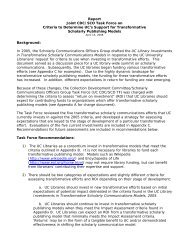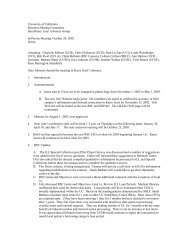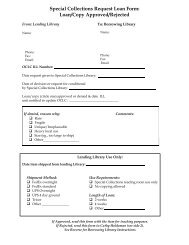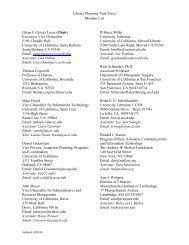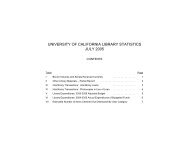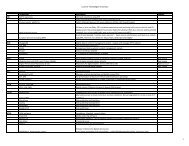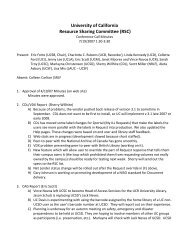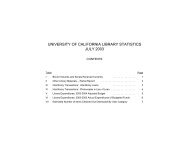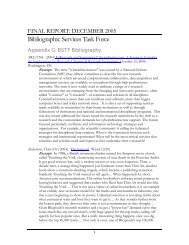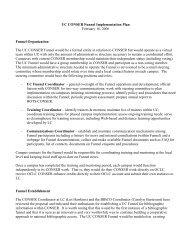The University of California Libraries: A Plan for Development (1977)
The University of California Libraries: A Plan for Development (1977)
The University of California Libraries: A Plan for Development (1977)
Create successful ePaper yourself
Turn your PDF publications into a flip-book with our unique Google optimized e-Paper software.
V. Identification and Location 65<br />
in-process as well as permanently cataloged, which are at present<br />
dispersed among many files in various locations." 12<br />
2. It can be much more up-to-date than any other alternative:<br />
card catalog, book catalog or micr<strong>of</strong>orm catalog. (And there is some<br />
evidence that scholars have been waiting <strong>for</strong> libraries to take such<br />
a step primarily <strong>for</strong> this reason; in 1967, the American Council <strong>of</strong><br />
Learned Societies commented in a report that cataloging was too slow,<br />
and that "clearly it is now reasonable to expect that research library<br />
catalogs will eventually move from card files into computerized<br />
<strong>for</strong>m.") 13<br />
3. It can be much more accurate, since corrections and changes<br />
in headings can be made readily. "<strong>The</strong> imminence <strong>of</strong> widespread<br />
changes in entries and subject headings makes this a particularly important<br />
potential." 14<br />
4. It allows <strong>for</strong> a system <strong>of</strong> automatic "authority control,"<br />
that is, <strong>for</strong> insuring that consistent terminology is used <strong>for</strong> all<br />
headings.<br />
5. For the user, it allows faster catalog searching. Ohio<br />
State estimates that "as many as seven or eight automated searches<br />
can be completed in the same amount <strong>of</strong> time it takes to complete one<br />
manual search." 15<br />
6. It provides multiple access points (the terms under which a<br />
search is made), not just the initial words <strong>of</strong> the headings chosen in<br />
the cataloging process.<br />
7. <strong>The</strong> access points may be combined to limit or define a<br />
search more precisely using Boolean logic techniques.<br />
12<br />
Judith Corin, et al., "Final Report, Working Group on Public Catalogs,"<br />
UCLA Library, 1976, p. 1.<br />
13<br />
American Council <strong>of</strong> Learned Societies, Committee on Research<br />
<strong>Libraries</strong>, On Research <strong>Libraries</strong>: Statement ... to the National<br />
Advisory Committee on <strong>Libraries</strong>, Washington, 1967, p. 28.<br />
14<br />
Corin, p. 2.<br />
15<br />
Ganning, pp. 63-64.



